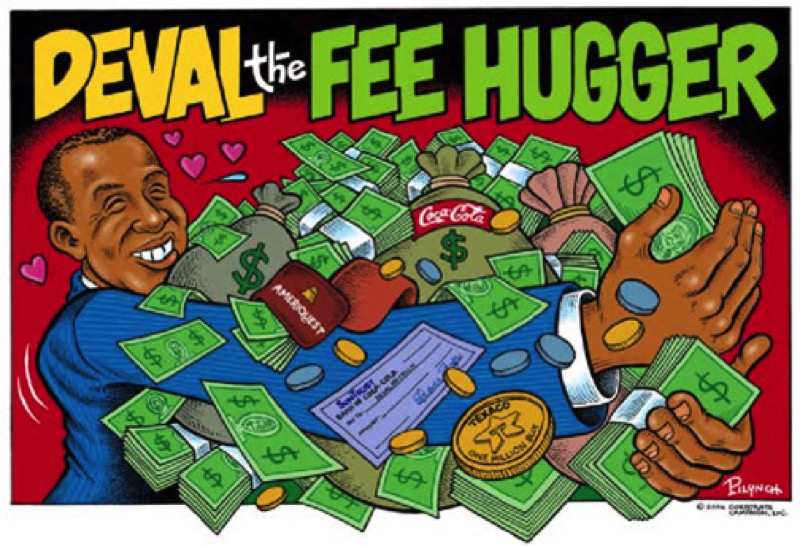NYC fact-finding delegation's report on human rights violations by Coke

NYC fact-finding delegation's report on human rights violations by Coke — Final Report, NYC Council Member Hiram Monserrate, April 2004
View Full Report in pdf — html
View Appendices
"The delegation found both the quantity and the nature of Coca-Cola workers' allegations shocking and compelling. It seems indisputable that Coke workers have been systematically persecuted for their union activity. It seems equally evident that the company has allowed if not itself orchestrated the human rights violations of its workers, and it has benefited economically from those violations, which have severely weakened the workers' union and their bargaining power."
WB11, New York Feature on the Campaign to Stop Killer Coke
On July 11, 2005, WB11, one of New York City area's major television stations aired a special "Fact Finders Report" on the Campaign to Stop Killer Coke called "Coca-Cola Faces Human Rights Violations." Interviewed are Campaign Director Ray Rogers, Hofstra University Campaign Activist Vanessa Cudabac, New York City Council Member Hiram Monserrate, New York City Comptroller William Thompson and American Postal Workers Union (APWU) Secretary-Treasurer Terry Stapleton. This excellent feature was watched by millions on WB11 and, as we found out from supporters, watched by others around the world on satellite television.
Play Film of Show
To get access to the film:
Userid: "corporatecampaign"
Password: "corporatecampaign0895"
The Campaign's response to Coke's lies in the WB11 feature: Read Response
The Nation, "The Case Against Coke," Michael Blanding, May 1, 2006 Issue
Read Article
"That was just the beginning of a ninety-minute slugfest that the Financial Times later said "felt more like a student protest rally" than a stockholders' meeting. One after another, students, labor activists and environmentalists blasted Coke's international human rights record...In the past two years the Coke campaign has grown into the largest anticorporate movement since the campaign against Nike for sweatshop abuses. Around the world, dozens of unions and more than twenty universities have banned Coke from their facilities, while activists have dogged the company from World Cup events in London to the Winter Olympics in Torino. More than just the re-emergence of the corporate boycott, however, the fight against Coke is a leap forward in international cooperation. Coke, with its red-and-white swoosh recognizable everywhere from Beijing to Baghdad, is perhaps the quintessential symbol of the US-dominated global economy. The fight to hold it accountable has, in turn, broadly connected issues across continents to become a truly globalized grassroots movement."
Business Week, " 'Killer Coke' Or Innocent Abroad?: Controversy over anti-union violence in Colombia has colleges banning Coca-Cola," By Dean Foust and Geri Smith, with Elizabeth Woyke in New York, Jan. 23, 2006
Read " 'Killer Coke' or Innocent Abroad?…"
" 'The reality is that the world of Coca-Cola is a world of lies, deceptions, corruption, gross human rights and environmental abuses!' thunders Rogers, a legendary union activist...Rogers' diatribes are starting to resonate on campuses from New Haven to Ann Arbor, where his 'Killer Coke' campaign has become the latest cause celebre among student activists — "the new Nike," as one puts it. At dozens of schools, small but feisty groups of students have demonstrated against the company — like the ones who staged a "die-in" during a 2004 Yale University speech by then-CEO Douglas N. Daft. Already, about 20 colleges in the U.S. and abroad have halted sales of Coke on campus, in part over the Colombia controversy."
Political Affairs, "Coca-Cola: Classic Union Buster," By Joel Wendland, July, 2006
Read Article
"The 'Coke side of life' is not paradise for thousands of Coke workers or the many communities forced to give up land and water resources to the multinational giant. Anger at the company's practices have led to an international campaign to decrease Coca-Cola's market share to punish the company for ongoing complicity in human, environmental and workers' rights abuses in Colombia, India, Peru, Nicaragua, Chile and numerous other countries...
"Rogers summed up Coke's abuse of people and the truth in a concise statement:
"The world of Coca-Cola is a world full of lies, deception, immorality, corruption and widespread labor, human rights and environmental abuses. When people think of the Coca-Cola Company, they should think of a company that has brought great hardship and despair to many people and communities throughout the world. When consumers think of Coca-Cola beverages, they should think of them as unthinkable and undrinkable until this company cleans up its act.
"In the end, Coke has spent millions, not to change the conditions of workers in its bottling plants or to improve the safety of the water supply in local communities, but to pressure, cajole and mislead consumers, to keep its products available and to suppress the truth. Living on 'the Coke side of life' is dangerous for Coke workers and pure fantasy for consumers."











